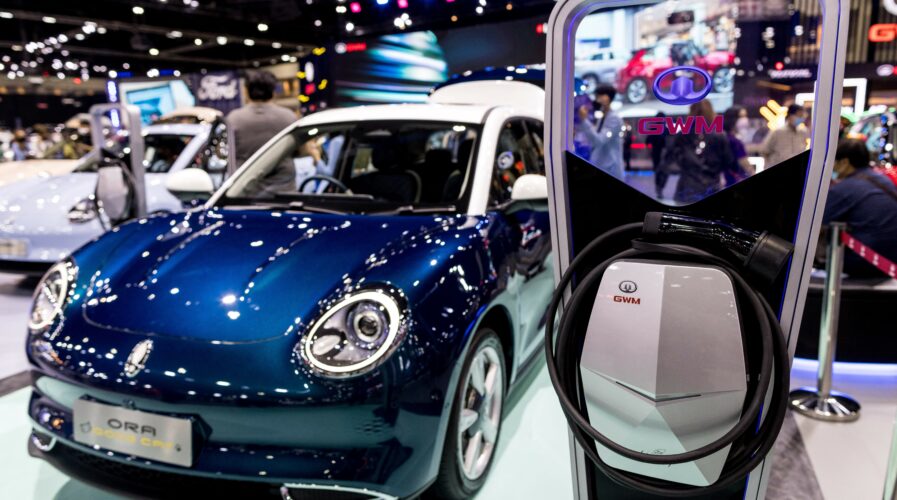
Foxconn, PTT will start mass producing EVs in Thailand by 2024. (Photo by Jack TAYLOR / AFP)
Foxconn, PTT will start mass producing EVs in Thailand by 2024
- Via a joint venture firm by Foxconn and PTT, a factory will be built in the country’s Eastern Economic Corridor (EEC), capable of producing 50,000 EVs a year.
- The two partners are expected to invest a combined US$1 to US$2 billion into the venture: PTT will hold a 60% stake and Foxconn, the remaining 40%.
As the largest auto producer in Southeast Asia, Thailand has a goal of making electric vehicles (EVs) to account for 30% of domestically made vehicles by 2030. To help solidify the country’s position as an electric mobility hotspot, Taiwanese contract manufacturer Foxconn and Thai energy conglomerate PTT Group (PTT) via their joint venture (JV) have agreed to begin mass producing EVs by 2024.
According to a report by Nikkei Asia, the JV, known as Horizon Plus, was established last week and is known with 60% of it owned by PTT while the balance 40% by Foxconn. Both companies are expected to invest a combined US$1 to US$2 billion into the venture.
The JV will first set up a factory in the Eastern Economic Corridor (EEC), Thailand’s advanced development zone and home to next-generation industries. PTT also wants to use Foxconn’s hardware and software services that will be open to “all players” in the EV space.
The factory will be able to produce about 50,000 EVs a year. The goal is to expand annual capacity to around 150,000 EVs by the end of this decade.
According to data gathered by Bloomberg, the automotive industry is one of Thailand’s most important sectors, contributing to about 10% of the economy, employs 850,000 workers, and supports industries from iron and steel to petrochemicals and plastic. About half of the cars made in Thailand are exported to countries including the Philippines, Indonesia and Malaysia.
Thailand’s bold plan also sets a target of having electric vehicles account for 50% of all new car registrations by the end of the decade, up from 30% previously. At this point, the country is going through a transitional period, with consumers waiting to see more infrastructure for EVs, particularly a clear rise in the number of charging stations, before deciding to switch to them.
Due to that, the Thai government has formulated plans for building charging stations and producing EV batteries. For instance, to increase battery production capacities, Thailand Energy Absolute and Global Power Synergy and PTT opened a battery plant in 2021. Even US-based Evlomo Inc. plans to build a battery plant in the SEA country.
READ MORE
- How a ‘hands-free’ approach to automation won Grab the Asian market
- 4 skills needed to thrive in the AI-driven future
- Three tech trends every HR professional must watch
- Alibaba to start selling cars from gigantic vending machines in China
- Can recruitment automation help your business find the perfect candidate?


